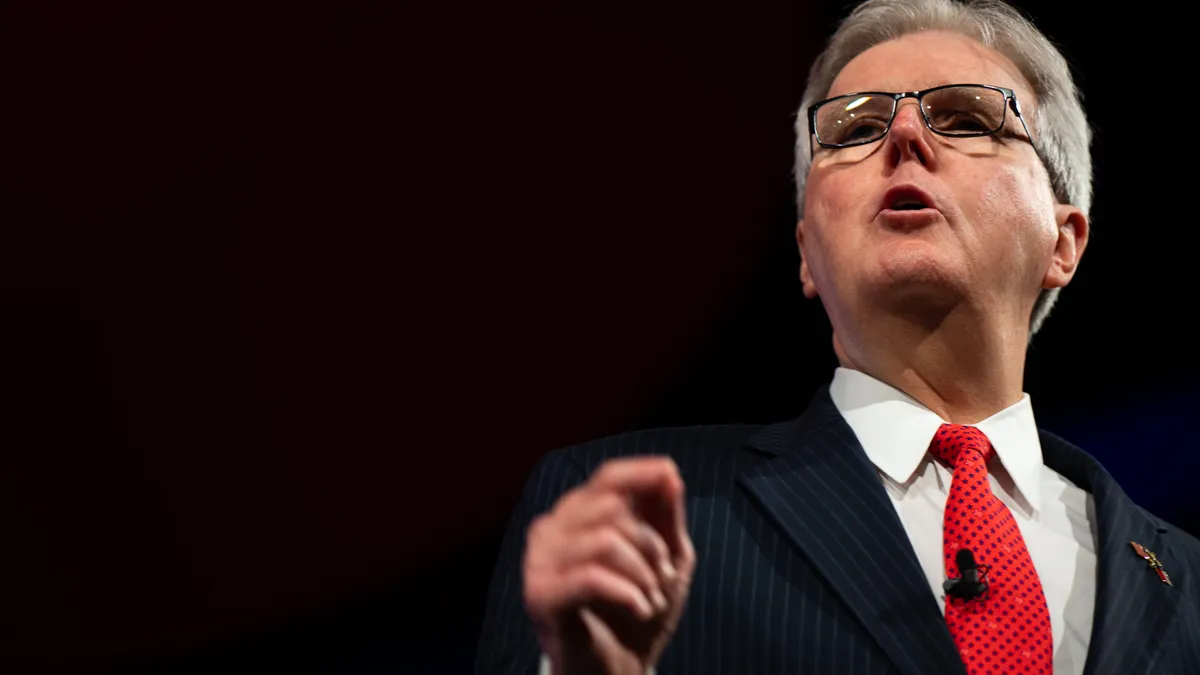Dive Brief:
- Texas Lt. Gov. Dan Patrick, a Republican, has pledged to end faculty tenure at the state's public colleges and revoke the status for professors who teach critical race theory.
- The proposal escalates a nationwide GOP movement against the decades-old academic framework. Patrick was reacting to a resolution by the University of Texas at Austin's faculty council affirming instructors' rights to teach race-related and social justice topics.
- Patrick's comments generated a firestorm from faculty and free speech groups, which said abolishing tenure would strike at academic freedom. UT-Austin's president also released a statement defending tenure.
Dive Insight:
Patrick's campaign to eliminate tenure falls in line with policymakers across the U.S., mainly in red states, attempting to increase their influence over public higher education.
Republicans nationwide have raged against critical race theory, an academic concept that describes the systemic nature of racism.
However, the GOP has used the term as a catchall for subjects they deem divisive, and many states have introduced legislation to forbid instruction of those topics in public education.
UT-Austin's faculty council last week in a 41-5 vote passed the resolution backing educators' ability to discuss critical race theory and race and gender justice. It also expressed solidarity with K-12 teachers whose educational purview was limited by new laws targeting critical race theory.
And it called for UT-Austin President Jay Hartzell and Provost Sharon Wood to reject attempts by external forces to dictate curriculum.
The statement provoked Patrick, who at a Friday press conference said the state would amp up oversight of professors who he said wanted to indoctrinate students. He also objected to the notion the public should not have a say in taxpayer-funded education.
Patrick specifically proposed ending tenure for newly hired professors. For those who are already tenured, he promised to reduce the cycle of reviewing tenure from every six years to one. And he said he would seek to add instruction of critical race theory as a reason to revoke tenure.
Texas' education code states institutions can rescind tenure in cases where faculty have demonstrated "incompetency, neglect of duty, or other good cause."
"We are not going to allow a handful of professors who do not represent the entire group to teach and indoctrinate students in critical race theory — that we are inherently racist as a nation," Patrick said. "We're not going to allow it to happen."
This week, Hartzell, UT-Austin's president, released a letter defending tenure, which he wrote provides faculty members with certain securities. Removing tenure would hurt the state's ability to attract and retain talent, he wrote.
And, he wrote, "future administrators might make annual retention decisions based on whether they or others did or didn't like a faculty member's current research agenda, rather than whether the quality of that research was excellent and held promise to have a positive impact on society."
The UT system did not respond to a request for comment Tuesday.
The American Association of University Professors slammed Patrick's idea and referred to his speech Friday as being "littered with disingenuous political theater and blatant falsehoods."
AAUP President Irene Mulvey said in a statement that the proposal represents a danger to higher ed by suggesting that government entities can censor "entire fields of knowledge in service to an ideology." Mulvey also said that the effects on Texas colleges' recruitment would be devastating.
The association employed similar arguments when South Carolina lawmakers late last year put forth a bill to end tenure at public colleges. That bill has been referred to a House committee. The bill sponsor said he wanted to align faculty employment with other industries that more frequently evaluate their workers.
At least one recent example shows that retaining faculty in the face of tenure threats can be expensive.
After Wisconsin weakened tenure protections about six years ago, the state's flagship institution, University of Wisconsin-Madison, spent about $9 million in raises and research funding to retain 40 top faculty members who at the time were being recruited elsewhere.
Patrick is in position to try to advance his plan, despite the pushback. Texas' lieutenant governor serves as the Senate president, and Patrick said during Friday's news conference he had the support of Republican state Sen. Brandon Creighton, chair of the Senate Committee on Higher Education, on the issue.
The lieutenant governor said he would introduce a bill to end tenure for the legislative session beginning January 2023.
Patrick is up for reelection this year. Texas holds its primary election March 1.














